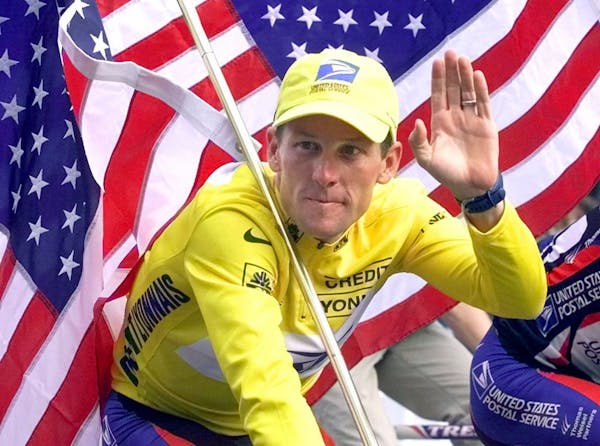Americans are ambivalent about integrity. We demand it from athletes - most of the time, anyway - but we send politicians back to office even when it's clear that they're owned lock, stock and barrel by special interests.
We teach our children to do the right thing, to admit when they're wrong. But let us get caught by a red-light camera and we go all 14th Amendment.
Social scientists who have studied the issue generally agree that 10 percent of people are honest all the time. Five percent will lie and cheat any time it's in their interest. And 85 percent are basically honest, but depending on circumstances, will cut a few corners or shave the truth from time to time.
This is what makes the Lance Armstrong saga so amazing: No one is defending him.
Bill Clinton has made the biggest comeback since Lazarus. Some of Richard Nixon's former staffers recently gathered on what would have been the Trickster's 100th birthday to say he wasn't so bad. Thirty-six percent of the baseball Hall of Fame voters had Barry Bonds on their ballots. But there's no love for Lance Armstrong.
If it had just been the doping-while-bicycling thing, it wouldn't be a big deal. Until Armstrong won the Tour de France, relatively few Americans cared about bicycling, combining as it does two narrow interests, France and bicycles.
When Armstrong beat all those gaunt Europeans at their own game, bicycling became all red, white and blue. You couldn't drive down a country road without running a gauntlet of Spandex.
Then came the gutsy recovery from cancer and more Tour wins and the Livestrong Foundation and those ubiquitous yellow rubber bracelets. He was a hero, giving back to his fellow cancer survivors, a medical marvel with a resting pulse rate of about 3, a human being who utilized oxygen like a gazelle.
Sure, his rivals were muttering about doping, but hey, it was bicycling, for crying out loud, not baseball. You have to expect those kinds of things.
Armstrong's biggest mistake was the cover-up, the loud protestations that he'd never tested positive. He played the American public for saps, even taking $40 million out of the U.S. Postal Service. Imagine: a bad business decision by the postal service.
Then came the fall, the anti-doping agency reports, sponsors bailing out. Finally there was last week's bizarre maybe-I-can-spin-my-way-out-of-this interview with America's confessor-in-chief, Oprah Winfrey.
Imagine the ego this all took. His threshold of self-delusion must be as high as his threshold of pain.
Now Armstrong has become the Bernie Madoff of American sports fraud.
Who can compare? The eight guys on the Chicago White Sox who threw the 1919 World Series? Pikers. They each got a few thousand bucks. Armstrong was said to be worth $100 million before the fall.
There were any number of sadsack boxers who took dives. There was the Boston College basketball point-shaving scandal of 1978-79 and betting scandals in the mid-2000s involving an NBA referee and some pro tennis players. There was Manti Te'o's fake dead girlfriend. Nothing comes close.
Baseball had its cocaine days in the 1970s and 1980s, but nobody was accused of fraud. The recent steroid scandals could have; a lot of games were won on the strength of outsized performances by juiced-up athletes.
But since Major League Baseball didn't have an effective anti-steroid policy until 2006, and the governing policy was pretty much to look the other way, nobody ever suggested overturning the results of a game. Pitchers who lost games on homers by Jose Canseco and Mark McGwire or hitters who got punched out by Roger Clemens must have thought about it, though.
The remnants of the steroid controversy play out in the annual Hall of Fame balloting, announced this year the week before Lance Armstrong stole the fraud spotlight. The Baseball Writers of America, as upright an organization as ever was (full disclosure: I was once a member, but never a Hall of Fame voter) decided that none of the stars linked to steroid use was spongeworthy. In fact, nobody was.
Good for the BBWAA. Someone has to enforce standards of integrity. The only bad part is the tedious arguments it creates. I would eliminate those by opening a special wing of the Hall of Fame - call it the rogues' gallery - for players whose performance was worthy but who took actions detrimental to the game's integrity.
Merely being a jerk would not get you into the rogues' gallery. You would have had to gamble or juice or build a career on flagrant cheating. The burden of proof would not be "guilty beyond a reasonable doubt," as it is in criminal cases, but guilt as it is in civil litigation: a preponderance of the evidence.
Lance Armstrong is not a baseball player, but I would put him into the rogues' gallery anyway. On principle. You remember principle.
The 'Civility Caucus'

Sports betting push at Legislature resorts to punitive leverage


